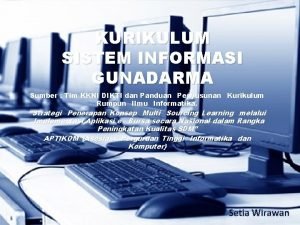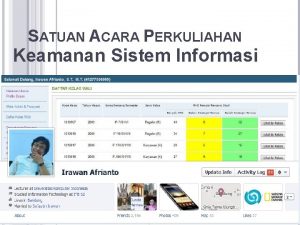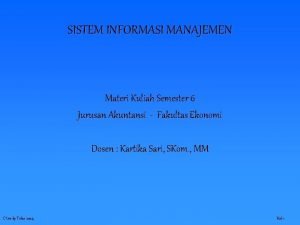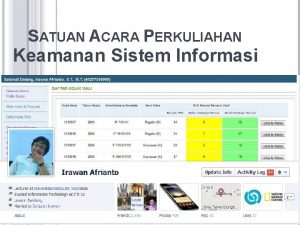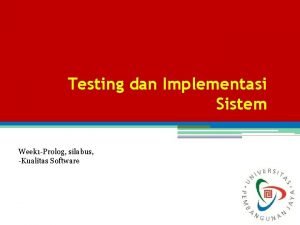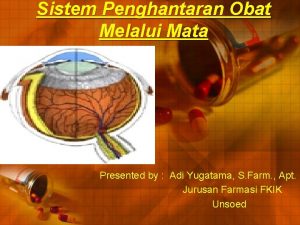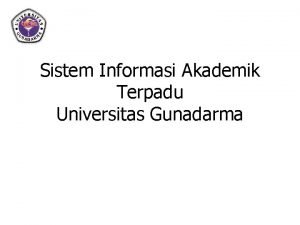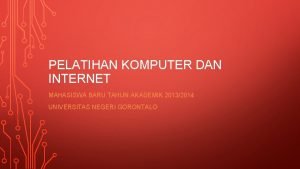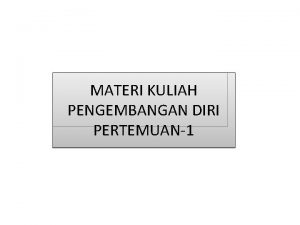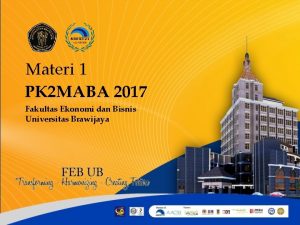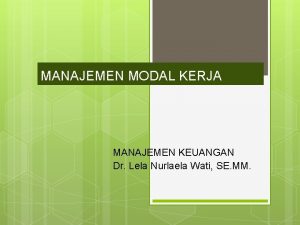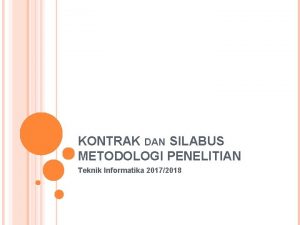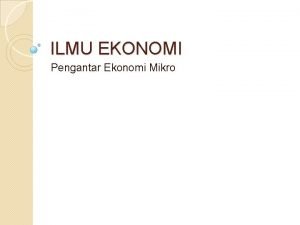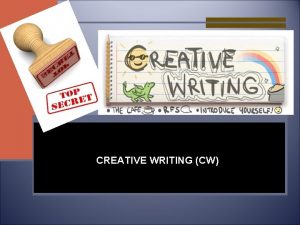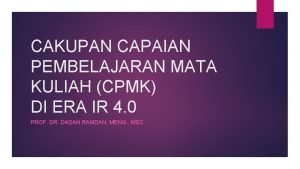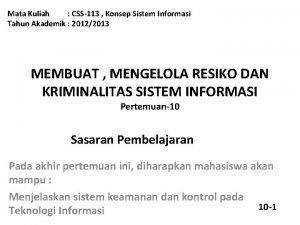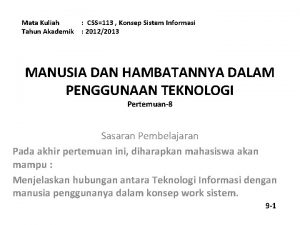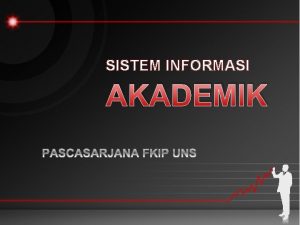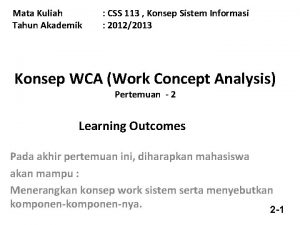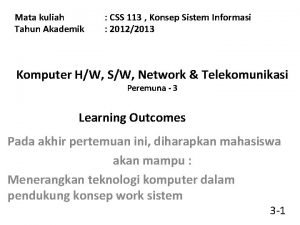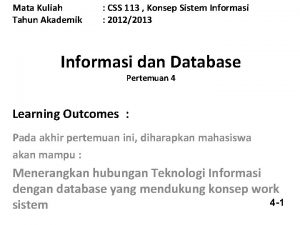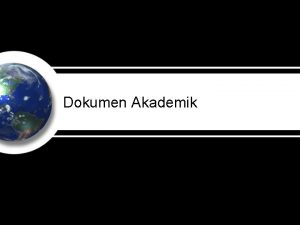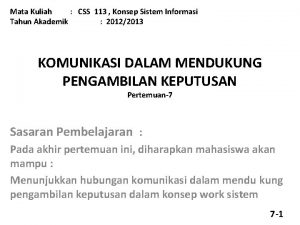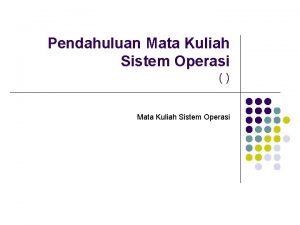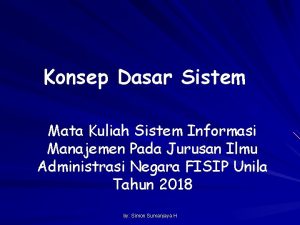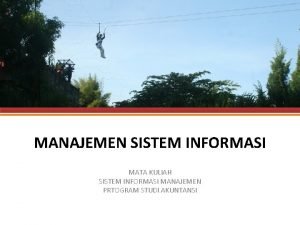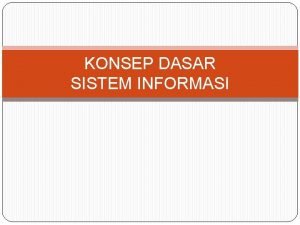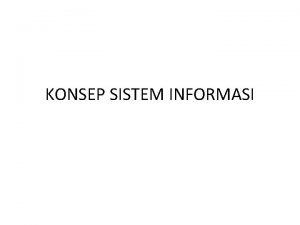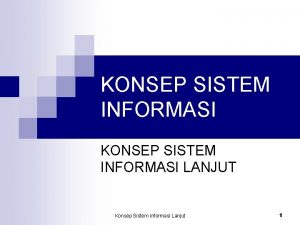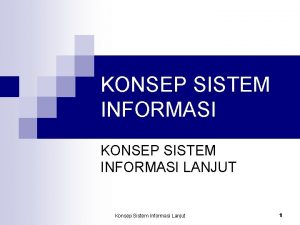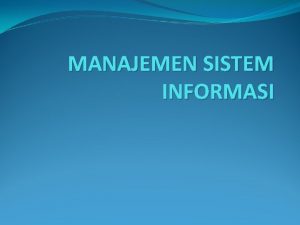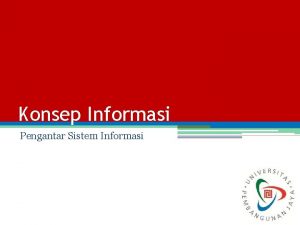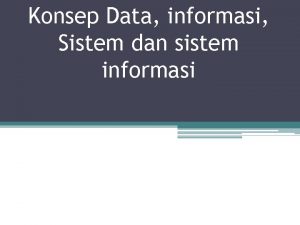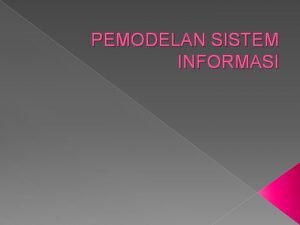Mata Kuliah CSS113 Konsep Sistem Informasi Tahun Akademik





















- Slides: 21

Mata Kuliah : CSS-113 , Konsep Sistem Informasi Tahun Akademik : 2012/2013 PRODUK DAN PELANGGAN Pertemuan-11 Sasaran Pembelajaran Pada akhir pertemuan ini, diharapkan mahasiswa akan mampu : Menunjukkan hubungan pelanggan dengan produk yang dihasilkan oleh sistem 11 -1

Materi Pokok • Pandangan pelanggan terhadap suatu produk • Kriteria pelanggan dalam mengevaluasi produk • Penggunaan sistem informasi untuk meningkatkan keunggulan produk terhadap pesaing 11 -2

Outline • • The Customer’s View of the Product The Customer’s Cycle of Involvement with a Product The Customer’s Criteria for Evaluating the Product Using Information systems for Competitive Advantage Electronic Commerce Opportunities Across the Customer Involvement Cycle Being Realistic About What Information Systems can do 3 11 -3

Introductory case: Otis Elevator • What business is Otis Elevator in? • Why is this information system important to their business? • How does this help them do a better job? • It this information of strategic importance to their business? 11 -4

The Customer’s View of the Product • Combining Information Physical and Service Content – Information product – Physical product – Service Product 11 -5

11 -6

Improving the product (Resumix) 11 -7

The Customer’s View of the Product • Controllability and Adaptability – Preprogrammed products – Interactive products – Programmable products • Examples of these? 11 -8

The Customer’s Cycle of Involvement with a Product • • • Requirements Acquisition Usage Maintenance Retirement 11 -9

11 -10

The Customer’s Criteria for Evaluating the Product COST Typical measures: • Purchase price • Cost of ownership • Amount of time and attention required Common information system roles: • Reduce internal cost of business process or increase productivity, making it easier to charge or allocate lower prices to customers • Improve product performance in ways that reduce the customer’s internal costs QUALITY Typical measures: • • • Defect rate per time interval or per quantity of output Rate of warranty returns Perceived quality according to customer Common roles: • • • Insure the product is produced more consistently 11 -11 Make it easier to customize the product for the customer Build information systems into the product to make it more usable or maintainable

The Customer’s Criteria for Evaluating the Product RESPONSIVENESS Typical measures: • Time to respond to customer request • Helpfulness of response Common roles: • Improve the speed of response • Systematize communication with customers • Increase flexibility to make it easier to respond to what the customer wants • RELIALBILITY Typical measures: • Average time to failure • Failure rate per time interval • Compliance to customer committment dates Common roles: • Make the business process more consistent • Make the business process more secure • Build features into the product that make it more reliable on its own right • CONFORMANCE TO STANDARDS AND REGULATIONS Typical measures: • Existence of nonconformance • Rate of complaints about nonconformance Common roles: • Clarify the standards and regulations • Systematize work to make the output more consistent 11 -12

Using Information Systems for Competitive Advantage • Strategic Information Systems – What is the difference between a mission-critical information system and strategic information system? • Competing by Increasing Value and Decreasing Cost – How can IT do this? • Make product features competitive; enhance • More timely delivery/service • Reduce cost 11 -13

Improving the Product (Otis Elevator) 11 -14

Is this a strategic information system ? • Why or why not? 11 -15

Electronic Commerce (e. Commerce) • Electronic Retailing – Amazon. com • Electronic Securities Trading – Etrade. com • Electronic Banking – Most any large bank… – Did ATM’s blaze the way? • Electronic Publishing – Free or fee-for-access (interactive. wsj. com) • The nuts & bolts… 11 -16

e. Commerce, continued… • Electronic (digital) signatures are increasingly important – Public key cryptography (see Ch. 13, figure 8) • SSL vs. SET – Digital wallets 11 -17

Opportunities Across the Customer Involvement Cycle • Determining Requirements – Product awareness…any IT opportunities here? • From telemarketing to AOL CD’s! – Sales support – Requirements analysis & customization • Acquiring the Product – Online sales, click & mortar – Adjusting the price • Lands End “OTC” 11 -18

Opportunities Across the Customer Involvement Cycle • Using the Product – GPS navigation in cars – Express checkin/checkout • Maintaining and Retiring the Product – Information about maintenance & repair cycles • Jiffylube “reminders” • Information used by service technician – Remote monitoring • Computers phoning in their own service calls • Security systems 11 -19

Being Realistic About What Information Systems Can Do • Not a panacea – Can significantly enhance the product, customer experience and/or competitive advantage – Must be well-planned and well-managed; otherwise failure is likely! 11 -20

Closing • Pandangan pelanggan terhadap suatu produk • Kriteria pelanggan dalam mengevaluasi produk • Penggunaan sistem informasi untuk meningkatkan keunggulan produk terhadap pesaing ===== thanks 4 your attention ===== 11 -21
 Kurikulum gunadarma
Kurikulum gunadarma Mata kuliah keamanan sistem informasi
Mata kuliah keamanan sistem informasi Materi sistem informasi manajemen semester 4
Materi sistem informasi manajemen semester 4 Mata kuliah manajemen proyek sistem informasi
Mata kuliah manajemen proyek sistem informasi Mata kuliah keamanan sistem informasi
Mata kuliah keamanan sistem informasi Mata kuliah testing dan implementasi sistem
Mata kuliah testing dan implementasi sistem Mata kuliah sistem produksi
Mata kuliah sistem produksi Ocular drug delivery system
Ocular drug delivery system Identifikasi blok, blok sistem informasi akademik
Identifikasi blok, blok sistem informasi akademik Transkrip gunadarma
Transkrip gunadarma Http //siat.ung.ac.id atau http //pmb.ung.ac.id
Http //siat.ung.ac.id atau http //pmb.ung.ac.id Mata kuliah etika profesi
Mata kuliah etika profesi Mata kuliah pengembangan diri
Mata kuliah pengembangan diri Erd kuliah
Erd kuliah Matkul ekonomi pembangunan ub
Matkul ekonomi pembangunan ub Mata kuliah pelayanan prima
Mata kuliah pelayanan prima Contoh soal modal kerja mata kuliah manajemen keuangan
Contoh soal modal kerja mata kuliah manajemen keuangan Silabus metode penelitian
Silabus metode penelitian Mata kuliah ilmu kelautan unpad
Mata kuliah ilmu kelautan unpad Deskripsi mata kuliah ekonomi mikro
Deskripsi mata kuliah ekonomi mikro Mata kuliah creative writing
Mata kuliah creative writing Cpmk
Cpmk
